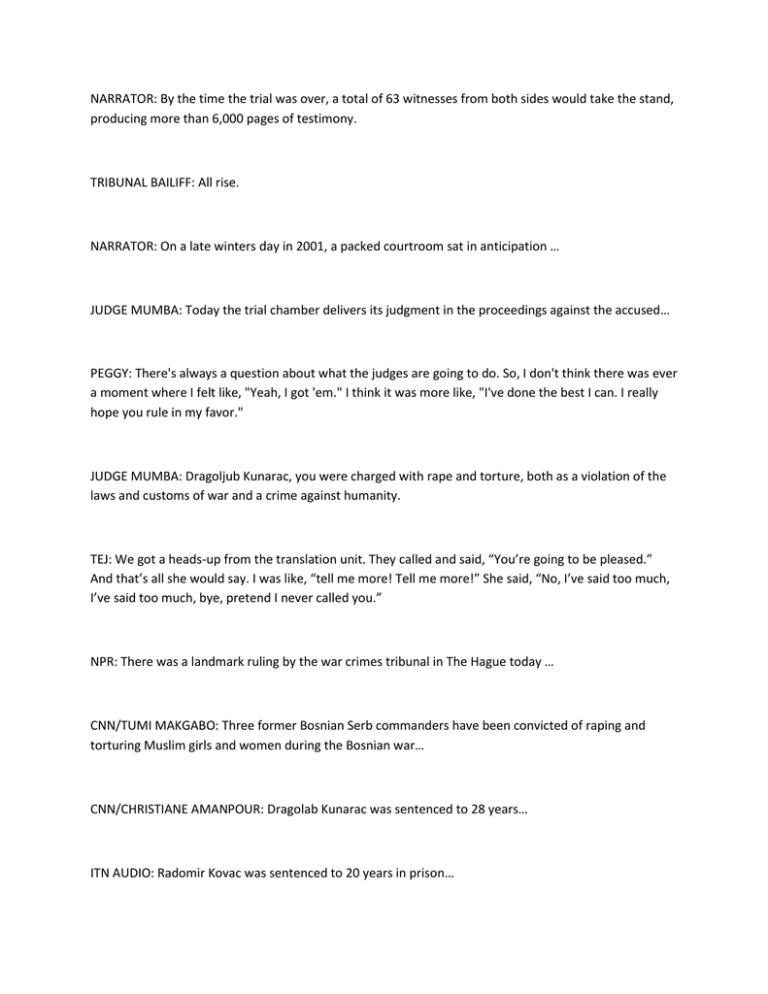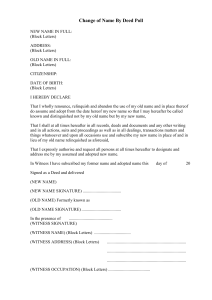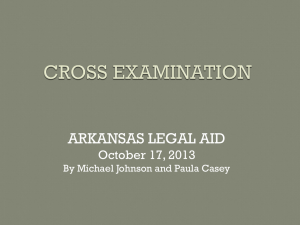NARRATOR: By the time the trial was over, a total of 63 witnesses
advertisement

NARRATOR: By the time the trial was over, a total of 63 witnesses from both sides would take the stand, producing more than 6,000 pages of testimony. TRIBUNAL BAILIFF: All rise. NARRATOR: On a late winters day in 2001, a packed courtroom sat in anticipation … JUDGE MUMBA: Today the trial chamber delivers its judgment in the proceedings against the accused… PEGGY: There's always a question about what the judges are going to do. So, I don't think there was ever a moment where I felt like, "Yeah, I got 'em." I think it was more like, "I've done the best I can. I really hope you rule in my favor." JUDGE MUMBA: Dragoljub Kunarac, you were charged with rape and torture, both as a violation of the laws and customs of war and a crime against humanity. TEJ: We got a heads-up from the translation unit. They called and said, “You’re going to be pleased.” And that’s all she would say. I was like, “tell me more! Tell me more!” She said, “No, I’ve said too much, I’ve said too much, bye, pretend I never called you.” NPR: There was a landmark ruling by the war crimes tribunal in The Hague today … CNN/TUMI MAKGABO: Three former Bosnian Serb commanders have been convicted of raping and torturing Muslim girls and women during the Bosnian war… CNN/CHRISTIANE AMANPOUR: Dragolab Kunarac was sentenced to 28 years… ITN AUDIO: Radomir Kovac was sentenced to 20 years in prison… ITN AUDIO: Zoran Vukovic 12 years… ITN NEWS: It’s the first time that sexual assault has been treated as a crime against humanity. ITN NEWS: And it’s the first time it’s used the charge of wartime sexual enslavement. NPR: This conviction established sexual enslavement as a crime against humanity. ITN AUDIO: The trial was distressing for lawyers and witnesses but may pave the way for justice for other victims. TEJ: These women did it, they did it. For me they are heroes, I was so in awe of their, of their, of their fight, of their having done what they did, of facing up to their demons and just refusing to back down from it. Yeah, for me it’s always still about them. REFIK: It was about the truth. It was about all of us knowing what happened at their expense. Let’s not forget this, this truth was not said in the privacy of the psychiatrists’ office or, you know, a session where they could really know that nobody else will know. It was said in the public forum. We can try to pretend to believe that their identities were protected – yes, they were protected from somebody who had no idea. But from their communities? Everybody knew who testified. REFIK: It was a pure act of heroism to me. Especially without any guarantee what the result will be in the end. NARRATOR : While the Foca verdicts were celebrated as a legal watershed, for the countless other women raped during the war in Bosnia, there would be no day at The Hague. TEJ: The Tribunal is a symbol, it’s an emblematic moment. And no tribunal of this sort can ever, ever prosecute every single crime that happened. At the end of the day that process has to be owned by the local courts, it has to go back to the national jurisdictions. NARRATOR: In Bosnia, the task of prosecuting war crimes fell to a disparate web of national and local courts spread across a country still fractured along ethnic lines. NARRATOR: Accurate legal records are hard to come by in Bosnia, but watchdog groups put the number of state prosecutions for all the wartime rapes at a mere 28. NARRATOR: With justice delayed, it is left to the survivors themselves to confront the country’s denial. NARRATOR: Nearly a decade after the war ended, and some three years after the guilty verdicts at The Hague, Witness 99 made a return to Foca. She came to the almost all-Serb town with a dozen other wartime rape survivors on a mission of remembrance. NARRATOR: They crossed the Drina River that once flowed with Muslim blood, passed the town’s monument to Serbs killed during the war … then tried to place a plaque as a tribute to those who suffered at Partizan Hall. BOSNIAN TV CORRESPONDENT: “No you won’t! No you won’t!” were the words of welcome from the assembled Serb citizens who greeted the “Women Victims of War Association.” The women had come to place a plaque at the site where they had been raped at the beginning of the war. WITNESS 99: When we saw that so many police officers had come for just the twelve of us, we were shocked. The police formed a line, arm to arm, so that we couldn’t break through. WITNESS 99: When we saw all the people there, we knew that anything could happen. CROWD: Leave! Leave! Goodbye! What happened, happened. WITNESS 99: The three-fingered salute that the woman is showing is a Serb sign. She’s telling us that we should go, that what happened happened and that we should leave. WITNESS 99: They kept saying things like, “They must have had such a great time, they had to come back for more.” They claim that none of this ever took place in Foca or Partizan. WITNESS 99: The plaque should have been placed there, but they didn’t let us. We left the plaque on the grass. BOSNIAN TV CORRESPONDENT: The “Women Victims of War” were seen out of Foca with insults, eggs, and rocks. WITNESS 99: I think the plaque should be put up for future generations, so they can learn what was done and what took place. People should know that this happened, and not just in Foca. This should be marked everywhere, so that history can record where these camps were - where women were kept prisoners and where horrible things happened to them. HILDEGARD: I think it takes just a long time 'til the majority of the people accept that their own committed awful things, really awful things. From my own experience in my own country, it takes decades to really bring that into the memory of everybody. I hope in the long term the judgments of the tribunal will actually lead to the fact that the majority of the population will not deny the events any longer. PEGGY : We haven’t prevented all rapes from happening. There are rapes happening all the time in conflict. But I think the fact that we did this trial makes people more aware of the issue and aware of the potential consequences. I think it’s a very powerful thing to be able to say “If you rape there is a possibility that you will be prosecuted and sent to jail. And the fact that it was war and that other people were doing it is not a defense.” REFIK: In terms of the development of international law, I’m sure everybody will agree that it has achieved a great deal, but when it comes to providing justice for the victims? They have to answer that question. WITNESS 99: I was glad that everyone would answer for what they had done. But it wasn’t a very harsh sentence. WITNESS 99: You know that rape is the worst form of humiliation for any woman. But that was the goal. To kill a woman’s dignity. WITNESS 99: It’s clear that all witnesses are a part of history, not just me. War criminals wouldn’t be known and there’d be no justice, if witnesses didn’t testify. WITNESS 99: I was glad to be able to say what had happened to me and to say who had done this to me and my people. WITNESS 99: I felt like I had fulfilled my duty. WITNESS 99: I’d come to look him in the face. WITNESS 99: I came to testify.






